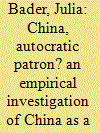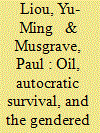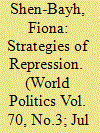|
|
|
Sort Order |
|
|
|
Items / Page
|
|
|
|
|
|
|
| Srl | Item |
| 1 |
ID:
138296


|
|
|
|
|
| Summary/Abstract |
Critics frequently accuse China of acting as a patron for autocratic states. But does Chinese engagement actually increase the stability of authoritarian clients? This article demonstrates that Chinese bilateral interactions have little effect on the longevity of autocratic regimes. Analyses of different forms of Chinese bilateral engagement between 1993 and 2008—including state visits, arms trading, aid projects, economic cooperation, and trade dependence—show that only export dependence on China may increase the likelihood of survival for autocratic regimes while doing little to stabilize their democratic counterparts.
|
|
|
|
|
|
|
|
|
|
|
|
|
|
|
|
| 2 |
ID:
133033


|
|
|
|
|
| Publication |
2014.
|
| Summary/Abstract |
Building a strong autocratic state requires stability in ruler-elite relations. From this perspective the absence of a successor is problematic, as the elite have few incentives to remain loyal if the autocrat cannot reward them for their loyalty after his death. However, an appointed successor has both the capacity and the motive to challenge the autocrat. We argue that a succession based on primogeniture solves the dilemma, by providing the regime with a successor who can afford to wait to inherit the throne peacefully. We test our hypothesis on a dataset covering 961 monarchs ruling 42 European states between 1000 and 1800, and show that fewer monarchs were deposed in states practicing primogeniture than in states practicing alternative succession orders. A similar pattern persists in the world's remaining absolute monarchies. Primogeniture also contributed to building strong states: In 1801 all European monarchies had adopted primogeniture or succumbed to foreign enemies.
|
|
|
|
|
|
|
|
|
|
|
|
|
|
|
|
| 3 |
ID:
139799


|
|
|
|
|
| Summary/Abstract |
Do human rights prosecutions deter dictatorships from relinquishing power? Advances in the study of human rights show that prosecutions reduce repression in transition countries. However, prosecuting officials for past crimes may jeopardize the prospects of regime change in countries that have not transitioned, namely dictatorships. The creation of the International Criminal Court has further revitalized this debate. This article assesses how human rights prosecutions influence autocratic regime change in neighboring dictatorships. We argue that when dictators and their elite supporters can preserve their interests after a regime transition, human rights prosecutions are less likely to deter them from leaving power. Using personalist dictatorship as a proxy for weak institutional guarantees of posttransition power, the evidence indicates that these regimes are less likely to democratize when their neighbors prosecute human rights abusers. In other dictatorships, however, neighbor prosecutions do not deter regimes from democratizing.
|
|
|
|
|
|
|
|
|
|
|
|
|
|
|
|
| 4 |
ID:
148032


|
|
|
|
|
| Summary/Abstract |
Economic development generally promotes women’s autonomy. Yet women in resource-rich autocracies fare more poorly than women in similarly wealthy industrial and postindustrial states. Some attribute this puzzling outcome to cultural causes, describing the apparent link between restrictions on women’s autonomy in resource-rich countries (especially in the Middle East) as spurious. Others argue that oil and gas rents cause a gendered resource curse through macroeconomic mechanisms. By contrast, we explain the association as a consequence of a political mechanism. We propose a theory of autocratic survival via antisocial policies chosen for the harms they inflict on targeted groups. Autocrats need to placate ideologically motivated members of their winning coalition. Antisocial policies serve as a costly and visible measure of rulers’ fidelity to these winning coalition members. Resource rents enable rulers to afford such policies, which would be infeasible in tax-reliant regimes. Restricting women’s autonomy thus forms part of a strategy of autocratic rule in resource-rich autocracies. Using quantitative evidence, we demonstrate that variations in women’s autonomy correlate with variations in oil income per capita in cross-country regressions. To trace variations within cases, we present case studies of Saudi Arabia and Iran to demonstrate processes consonant with our theory.
|
|
|
|
|
|
|
|
|
|
|
|
|
|
|
|
| 5 |
ID:
161961


|
|
|
|
|
| Summary/Abstract |
Strategies of repression vary widely between extrajudicial and judicial extremes, from unrestrained acts of violence to highly routinized legal procedures. While the former have received a great deal of scholarly attention, judicial methods remain relatively understudied. When and why do rulers repress their rivals in court? The author argues that autocrats use a judicial strategy of repression when confronting challengers from within the ruling elite. Unlike regime outsiders, who pose a common, external threat to mobilize against, insiders present a more divisive target. When autocrats confront the latter, a judicial strategy legitimizes punishment, deters future rivals, and generates shared beliefs regarding incumbent strength and challenger weakness. Using original data on political prisoners in postcolonial sub-Saharan Africa, the author finds that autocrats were significantly more likely to use a judicial strategy against insiders and an extrajudicial strategy against outsiders. A case study of Kenya traces the logic of the theory, showing how intraregime conflict made courts a valuable instrument of state repression. The findings demonstrate how courts can play a central role in autocratic survival.
|
|
|
|
|
|
|
|
|
|
|
|
|
|
|
|
|
|
|
|
|